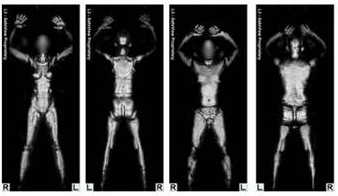May, 28, 2008, As TSA continues to deploy new
technology, some people continue to be confused about whole body imagers.
Millimeter wave, backscatter, privacy filters… it all adds up to a confused
traveling public. Both millimeter wave and backscatter fall under the
classification of whole body imaging, which gives security officers a
virtual image of a passenger that highlights potentially dangerous items.
Here’s the lowdown on the two technologies.
How millimeter wave works: Beams
of radio frequency (RF) energy in the millimeter wave spectrum are projected
over the body’s surface at high speed from two antennas simultaneously as
they rotate around the body. The RF energy reflected back from the body or
other objects on the body is used to construct a three-dimensional image.
The three-dimensional image of the body, with facial features blurred for
privacy, is displayed on a remote monitor for analysis. The image is not
saved – once it’s off the screen it’s gone forever.
This is
the millimeter wave image a security officer sees.
How backscatter works: A
narrow, low intensity X-ray beam is scanned over the body's surface at
high speed. The technology relies on the X-ray radiation that is
reflected back from the body and other objects placed or carried on the
body, where it is converted into a computer image, embedded with a
modesty filter and displayed on a remote monitor. Passengers will walk up
to the backscatter unit, assisted by a transportation security officer
and remain still for several seconds while the technology creates an
image of the body. Images will be deleted
immediately once viewed and will never be stored, transmitted or printed
(the passenger imaging units have zero storage capability).
This is the
backscatter image the security officer sees
This is a
backscatter machine.




